| Listing 1 - 10 of 11 | << page >> |
Sort by
|
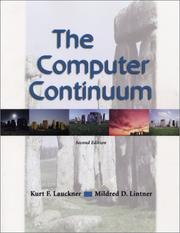
ISBN: 0130898139 Year: 2001 Publisher: Upper Saddle River, N.J. Prentice Hall
Abstract | Keywords | Export | Availability | Bookmark
 Loading...
Loading...Choose an application
- Reference Manager
- EndNote
- RefWorks (Direct export to RefWorks)
Computer. Automation --- Computer science. --- computer --- hardware --- software --- CPU --- simulatie --- kunstmatige intelligentie (artificiële intelligentie) --- internet
Book
ISBN: 9781492032649 1492032646 1492032638 149203259X 1492032611 Year: 2019 Publisher: Sebastopol O'Reilly Media
Abstract | Keywords | Export | Availability | Bookmark
 Loading...
Loading...Choose an application
- Reference Manager
- EndNote
- RefWorks (Direct export to RefWorks)
Through a series of recent breakthroughs, deep learning has boosted the entire field of machine learning. Now, even programmers who know close to nothing about this technology can use simple, efficient tools to implement programs capable of learning from data. This practical book shows you how.By using concrete examples, minimal theory, and two production-ready Python frameworks--Scikit-Learn and TensorFlow--author Aurélien Géron helps you gain an intuitive understanding of the concepts and tools for building intelligent systems. You'll learn a range of techniques, starting with simple linear regression and progressing to deep neural networks. With exercises in each chapter to help you apply what you've learned, all you need is programming experience to get started. Explore the machine learning landscape, particularly neural nets Use Scikit-Learn to track an example machine-learning project end-to-end Explore several training models, including support vector machines, decision trees, random forests, and ensemble methods Use the TensorFlow library to build and train neural nets Dive into neural net architectures, including convolutional nets, recurrent nets, and deep reinforcement learning Learn techniques for training and scaling deep neural nets
Machine Learning --- Artificial intelligence --- Machine learning. --- Apprentissage automatique --- Computer algorithms. --- Algorithmes --- Artificial intelligence. Robotics. Simulation. Graphics --- Artificial intelligence. --- Python (Computer program language) --- TensorFlow. --- Apprentissage automatique. --- Intelligence artificielle. --- Python (langage de programmation) --- Algorithmes. --- TensorFlow --- Scikit-Learn --- Python (Computer program language). --- machine learning --- kunstmatige intelligentie (artificiële intelligentie) --- Scikit-learn --- Keras --- deep learning
Periodical
ISSN: 01628828 Publisher: Washington (D.C.) IEEE Computer Society
Abstract | Keywords | Export | Availability | Bookmark
 Loading...
Loading...Choose an application
- Reference Manager
- EndNote
- RefWorks (Direct export to RefWorks)
spraaktechnologie --- KI (kunstmatige intelligentie) --- Computer. Automation --- Artificial Intelligence --- General and Others. --- Information Technology. --- Information Technology --- General and Others --- #TELE:d.d. Prof. A. J. J. Oosterlinck --- #TS:WBIB --- intelligente automatisering --- ied (intelligent electronic devices) --- patroonherkenning --- algoritme --- kunstmatige intelligentie (artificiële intelligentie) --- Periodicals --- Artificial intelligence --- Pattern perception --- Pattern recognition systems --- Intelligence artificielle --- Perception des structures --- Reconnaissance des formes (Informatique) --- Périodiques --- Computer. Informatica. Automatisering --- Journal --- artificiële intelligentie (AI) --- Artificial intelligence. --- AI (artificiële intelligentie)
Book

ISBN: 0130803022 9780130803023 Year: 2003 Publisher: Englewood Cliffs Prentice Hall
Abstract | Keywords | Export | Availability | Bookmark
 Loading...
Loading...Choose an application
- Reference Manager
- EndNote
- RefWorks (Direct export to RefWorks)
Artificial intelligence. Robotics. Simulation. Graphics --- 681.3*I20 --- 681.3*I2 --- 000.1 --- 681.39 --- kunstmatige intelligentie (artificiële intelligentie) --- Artificial intelligence (AI) in general; cognitive simulation; philosophical foundations --- Artificial intelligence. AI --- Algemene werken --- Artificiële intelligentie. Robotica. Simulatie. Graphics --- Basic Sciences. Mathematics --- Mathematical Models, Simulation Models --- Mathematical Models, Simulation Models. --- 681.3*I20 Artificial intelligence (AI) in general; cognitive simulation; philosophical foundations --- 681.3*I2 Artificial intelligence. AI --- artificiële intelligentie (AI)
Book
ISBN: 9067892521 9067894842 Year: 1994 Publisher: Amsterdam Addison Wesley
Abstract | Keywords | Export | Availability | Bookmark
 Loading...
Loading...Choose an application
- Reference Manager
- EndNote
- RefWorks (Direct export to RefWorks)
In de eerste helft staan de standaardsystemen van de propositielogica en de predikaatlogica centraal. De propositielogica richt zich op de structuur van beweringen met zogenaamde Boolese operatoren. De predikaatlogica richti zich op beweringen met zogenaamde kwantificerende uitdrukkingen. De tweede helft van het boek behandelt modale logica en toepassingen van de logica in de informatica en in de kunstmatige intelligentie, waarbij o.a. de semantiek van imperatieve programmeertalen, programmacorrectheid, logisch programmeren, niet-monotoon redeneren en intervalnetwerken aan de orde komen. Het boek sluit af met een aantal interessante globale terreinverkenningen voor de toekomst, waarin o.a. de logica van dynamische interpretatie, niet-standaard redeneren en de logica van voorkomens (lineaire logica) aan bod komen.
Logic programming --- Logisch programmeren --- Logische programmering --- Programmation logique --- Programmeren [Logisch ] --- Programming [Logic ] --- 681.3*F3 --- 681.31 --- 164 --- logica --- programmeren --- kunstmatige intelligentie (artificiële intelligentie) --- 16 --- 681.3 --- Logica : informatica --- Logics and meanings of programs (Theory of computation) --- Theoretische informatica --- Mathematische logica --- Language and logic. --- 681.3*F3 Logics and meanings of programs (Theory of computation) --- programmeerbare logica --- robots --- informatica --- Artificial intelligence. Robotics. Simulation. Graphics --- Computer science --- Mathematical logic --- 133
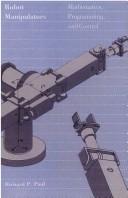
ISBN: 026216082X Year: 1981 Publisher: Cambridge : M.I.T. Press,
Abstract | Keywords | Export | Availability | Bookmark
 Loading...
Loading...Choose an application
- Reference Manager
- EndNote
- RefWorks (Direct export to RefWorks)
kunstmatige intelligentie (artificiële intelligentie) --- programmeren --- robotsturing --- Robotics: manipulators propelling mechanisms sensors (Artificial intelli- gence) --- 681.3*I29 Robotics: manipulators propelling mechanisms sensors (Artificial intelli- gence) --- 681.3*I29 Robotics: manipulators; propelling mechanisms; sensors (Artificial intelli- gence) --- Robotics: manipulators; propelling mechanisms; sensors (Artificial intelli- gence) --- Manipulators (Mechanism) --- Robotics --- Robotica --- 681.3*I29 --- Mechanical manipulators --- Robots, Industrial --- Robots --- Automation --- Machine theory --- #BIBC:T1999 --- robots --- Computer. Automation --- Manipulators (Mechanism). --- Robotics. --- #TELE:MI2 --- Robotique --- Manipulateurs (Mécanismes) --- artificiële intelligentie --- dynamica --- kinematica --- transformaties --- Asservissement
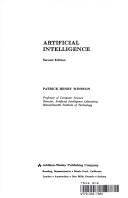
ISBN: 0201082594 9780201082593 Year: 1984 Publisher: Reading : Addison-Wesley,
Abstract | Keywords | Export | Availability | Bookmark
 Loading...
Loading...Choose an application
- Reference Manager
- EndNote
- RefWorks (Direct export to RefWorks)
Artificial intelligence. Robotics. Simulation. Graphics --- Artificial intelligence --- Computers --- Intelligence --- 681.3*I20 --- 681.3*I2 --- kunstmatige intelligentie (artificiële intelligentie) --- Kunstmatige intelligentie --- AI (Artificial intelligence) --- Artificial thinking --- Electronic brains --- Intellectronics --- Intelligence, Artificial --- Intelligent machines --- Machine intelligence --- Thinking, Artificial --- Bionics --- Cognitive science --- Digital computer simulation --- Electronic data processing --- Logic machines --- Machine theory --- Self-organizing systems --- Simulation methods --- Fifth generation computers --- Neural computers --- Artificial intelligence (AI) in general; cognitive simulation; philosophical foundations --- Artificial intelligence. AI --- Artificial intelligence. --- 681.3*I2 Artificial intelligence. AI --- 681.3*I20 Artificial intelligence (AI) in general; cognitive simulation; philosophical foundations --- artificiële intelligentie (AI)
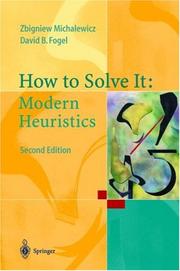
ISBN: 9783642061349 3642061346 3540224947 3662078074 3540660615 9783540224945 9783540660613 Year: 2000 Publisher: Berlin : Springer,
Abstract | Keywords | Export | Availability | Bookmark
 Loading...
Loading...Choose an application
- Reference Manager
- EndNote
- RefWorks (Direct export to RefWorks)
No pleasure lasts long unless there is variety in it. Publilius Syrus, Moral Sayings We've been very fortunate to receive fantastic feedback from our readers during the last four years, since the first edition of How to Solve It: Modern Heuristics was published in 1999. It's heartening to know that so many people appreciated the book and, even more importantly, were using the book to help them solve their problems. One professor, who published a review of the book, said that his students had given the best course reviews he'd seen in 15 years when using our text. There can be hardly any better praise, except to add that one of the book reviews published in a SIAM journal received the best review award as well. We greatly appreciate your kind words and personal comments that you sent, including the few cases where you found some typographical or other errors. Thank you all for this wonderful support.
Problem solving. --- Heuristic programming. --- Operational research. Game theory --- Heuristic --- Mathematical recreations --- Problem solving --- 518.5 --- 658.012 --- 681.3*I28 --- Methodology --- Psychology --- Decision making --- Executive functions (Neuropsychology) --- Mathematical puzzles --- Number games --- Recreational mathematics --- Recreations, Mathematical --- Puzzles --- Scientific recreations --- Games in mathematics education --- Magic squares --- Magic tricks in mathematics education --- Philosophy --- 681.3*I28 Problem solving, control methods and search: backtracking; dynamic program- ming; graph and tree search strategies; heuristics; plan execution, formationand generation (Artificial intelligence)--See also {681.3*F22} --- Problem solving, control methods and search: backtracking; dynamic program- ming; graph and tree search strategies; heuristics; plan execution, formationand generation (Artificial intelligence)--See also {681.3*F22} --- Operationeel onderzoek. Speltheorie --- Planning in het bedrijf --- Problem Solving. --- Heuristic. --- Mathematical recreations. --- heuristiek --- kansrekening --- kunstmatige intelligentie (artificiële intelligentie) --- statistiek --- wiskunde --- 681.3*I2 --- 681.3*I2 Artificial intelligence. AI --- Artificial intelligence. AI --- Résolution de problème --- Heuristique --- Jeux mathématiques --- Planning (firm) --- Artificial intelligence. Robotics. Simulation. Graphics --- probleemoplossend denken --- algoritmen --- Computer programming. --- Algorithms. --- Economics, Mathematical . --- Calculus of variations. --- Statistics . --- Computational complexity. --- Programming Techniques. --- Algorithm Analysis and Problem Complexity. --- Quantitative Finance. --- Calculus of Variations and Optimal Control; Optimization. --- Statistics, general. --- Complexity. --- Computers --- Electronic computer programming --- Electronic data processing --- Electronic digital computers --- Programming (Electronic computers) --- Coding theory --- Complexity, Computational --- Machine theory --- Statistical analysis --- Statistical data --- Statistical methods --- Statistical science --- Mathematics --- Econometrics --- Economics --- Mathematical economics --- Algorism --- Algebra --- Arithmetic --- Isoperimetrical problems --- Variations, Calculus of --- Maxima and minima --- Programming --- Foundations --- artificiële intelligentie (AI) --- Basic Sciences. Statistics --- Probability Theory, Sampling Theory.
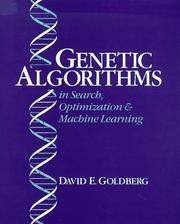
ISBN: 0201157675 9780201157673 Year: 1989 Publisher: Reading : Addison-Wesley Publishing Company,
Abstract | Keywords | Export | Availability | Bookmark
 Loading...
Loading...Choose an application
- Reference Manager
- EndNote
- RefWorks (Direct export to RefWorks)
Artificial intelligence. Robotics. Simulation. Graphics --- Planning (firm) --- natuurlijke selectie --- Computer science --- genetische algoritmen --- bedrijfseconomie --- zoekmethoden --- Genetic algorithms --- Machine learning --- Algorithmes génétiques --- Apprentissage automatique --- Genetic Algorithms --- Machine Learning --- 681.3*G20 --- 681.3*I22 --- 681.3*I26 --- 681.3*I28 --- 510.5 --- 681.3*I2 --- AA / International- internationaal --- 305.976 --- genetisch algoritme --- kunstmatige intelligentie (artificiële intelligentie) --- algoritme --- GBML(genetic-based machine learning) --- Learning, Machine --- Artificial intelligence --- Machine theory --- GAs (Algorithms) --- Genetic searches (Algorithms) --- Algorithms --- Combinatorial optimization --- Evolutionary computation --- Genetic programming (Computer science) --- Learning classifier systems --- Computerwetenschap--?*G20 --- Automatic programming: automatic analysis of algorithms; program modification; program synthesis; program transformation; program verification (Artificialintelligence)--See also {681.3*D12}; {681.3*F31} --- Learning: analogies; concept learning; induction; knowledge acquisition; language acquisition; parameter learning (Artificial intelligence)--See also {681.3*K32} --- Problem solving, control methods and search: backtracking; dynamic program- ming; graph and tree search strategies; heuristics; plan execution, formationand generation (Artificial intelligence)--See also {681.3*F22} --- Algorithms. Computable functions --- Artificial intelligence. AI --- Algoritmen. Optimisatie. --- Genetic algorithms. --- Machine learning. --- Basic Sciences. Mathematics --- Algebra --- Algebra. --- 681.3*I2 Artificial intelligence. AI --- 510.5 Algorithms. Computable functions --- 681.3*I28 Problem solving, control methods and search: backtracking; dynamic program- ming; graph and tree search strategies; heuristics; plan execution, formationand generation (Artificial intelligence)--See also {681.3*F22} --- 681.3*I26 Learning: analogies; concept learning; induction; knowledge acquisition; language acquisition; parameter learning (Artificial intelligence)--See also {681.3*K32} --- 681.3*I22 Automatic programming: automatic analysis of algorithms; program modification; program synthesis; program transformation; program verification (Artificialintelligence)--See also {681.3*D12}; {681.3*F31} --- Algorithmes génétiques --- Algoritmen. Optimisatie --- Optimisation combinatoire --- artificiële intelligentie (AI)
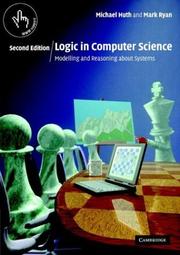
ISBN: 052154310X 9780521543101 Year: 2004 Publisher: Cambridge : Cambridge University Press,
Abstract | Keywords | Export | Availability | Bookmark
 Loading...
Loading...Choose an application
- Reference Manager
- EndNote
- RefWorks (Direct export to RefWorks)
The second edition of this successful textbook continues to provide a clear introduction to formal reasoning relevant to the needs of modern computer science and sufficiently exacting for practical applications. Improvements have been made throughout with many new and expanded text sections. The coverage of model-checking has been substantially updated and additional exercises are included. Internet support includes worked solutions for teacher exercises and model solutions to some student exercises. First Edition Hb (2000): 0-521-65200-6 First Edition Pb (2000): 0-521-65602-8
Computer logic --- Logic programming (Computer science) --- Computer logic. --- Logic programming. --- Logic programming (Computer science). --- Logique informatique --- 681.3*F11 <043> --- Models of computation: automata bounded action devices computability theory relations among models self-modifying machines unbounded-action devices--See also {681.3*F41}--Dissertaties --- 681.3*F11 <043> Models of computation: automata bounded action devices computability theory relations among models self-modifying machines unbounded-action devices--See also {681.3*F41}--Dissertaties --- 681.3*F41 Mathematical logic: computability theory computational logic lambda calculus logic programming mechanical theorem proving model theory proof theoryrecursive function theory--See also {681.3*F11} {681.3*I22} {681.3*I23} --- Mathematical logic: computability theory computational logic lambda calculus logic programming mechanical theorem proving model theory proof theoryrecursive function theory--See also {681.3*F11} {681.3*I22} {681.3*I23} --- 681.3*F11 Models of computation: automata bounded action devices computability theory relations among models self-modifying machines unbounded-action devices--See also {681.3*F41} --- Models of computation: automata bounded action devices computability theory relations among models self-modifying machines unbounded-action devices--See also {681.3*F41} --- computermodel --- 681.3*F41 Mathematical logic: computability theory; computational logic; lambda calculus; logic programming; mechanical theorem proving; model theory; proof theory;recursive function theory--See also {681.3*F11}; {681.3*I22}; {681.3*I23} --- Mathematical logic: computability theory; computational logic; lambda calculus; logic programming; mechanical theorem proving; model theory; proof theory;recursive function theory--See also {681.3*F11}; {681.3*I22}; {681.3*I23} --- 681.3*F11 Models of computation: automata; bounded action devices; computability theory; relations among models; self-modifying machines; unbounded-action devices--See also {681.3*F41} --- Models of computation: automata; bounded action devices; computability theory; relations among models; self-modifying machines; unbounded-action devices--See also {681.3*F41} --- Logic programming --- 681.3*F11 <043> Models of computation: automata; bounded action devices; computability theory; relations among models; self-modifying machines; unbounded-action devices--See also {681.3*F41}--Dissertaties --- Models of computation: automata; bounded action devices; computability theory; relations among models; self-modifying machines; unbounded-action devices--See also {681.3*F41}--Dissertaties --- Computer programming --- Computer science logic --- Logic, Symbolic and mathematical --- 681.3*F11 --- 681.3*F41 --- computerarchitectuur --- kunstmatige intelligentie (artificiële intelligentie) --- Computer science --- Mathematical logic --- Computer programs --- Logiciels --- Verification --- Vérification --- Informatique --- Logique mathématique --- Logique mathématique --- Vérification
| Listing 1 - 10 of 11 | << page >> |
Sort by
|

 Search
Search Feedback
Feedback About UniCat
About UniCat  Help
Help News
News